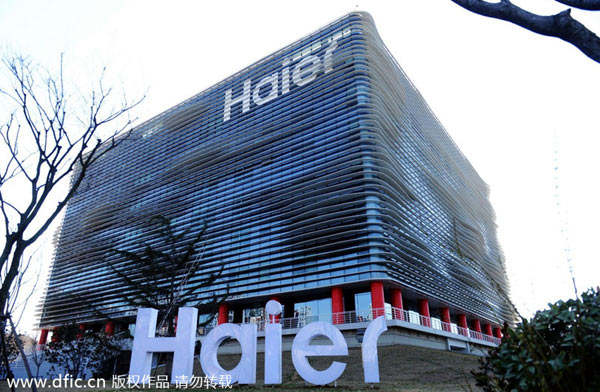 |
|
Photo taken on March 20, 2014 shows the Board of Directors' building of Haier Electronics Group Co Ltd in Qingdao. [Photo/IC] |
BEIJING - China's leading home appliance maker Haier is determined to become a leader in the Internet age.
In a few short years, the Haier Group has quietly built up Internet-based smart factories, where mass production of personalized products has replaced the company's traditional large-scale manufacturing.
The new smart factories allow users to personalize appliances by communicating their needs directly with the manufacturer through Haier's new app "U+ Smart Living".
By logging on they can specify customizations and get pricing on changes such as larger control screens, different colors and noise reduction for washing machines. In one instance, a customer was able to order an air-conditioner that filtered methanol. The app also allows customers to offer suggestions which will be considered by Haier's global design team.
The technology is already in place at a factory producing web-connected air conditioners in Zhengzhou city and a refrigerator factory in Shenyang. Two more smart factories, one producing washing machines in Foshan and the other making water heaters in Qingdao, are expected to begin operation this year.
The tailor-made products have been a huge hit with customers, Li Pan, vice president of Haier's home appliance industry, said.
The new "U+ Smart living" app also allows users to control web-connected household appliances through their mobile device. The company plans on releasing a new Internet-connected refrigerator using Google's Android operating system in June, Li said.
With a slowing economy and rising labor costs weighing on sales and squeezing profit margins, Haier is not the only Chinese company looking to the Internet to gain an edge, but it appears to be among the most advanced.
It is the first and only Chinese brand working with Apple to employ their HomeKit platform, which can use Siri voice commands to control home devices.
Haier's strategy stems is based on their vision of business in an Internet-dominated future, where users' experience is of great significance, Haier Group chairman Zhang Ruimin said.
It is part of a continual process of reinvention that dates back to 1984, when Zhang was appointed the head of the then struggling state-owned fridge factory.
In 1985, Zhang handed out sledgehammers and joined the staff in smashing 76 faulty fridges in public, which signified the firm's quest for quality and was the start of its transformation.
Riding on China's economic rise, Haier has secured its market share at home and was the first Chinese brand to spread its wings abroad.
Unlike many Chinese firms, Haier did not start its international expansion by purchasing overseas assets or by entering other emerging economies. It first targeted niche markets neglected by Western manufacturers, like mini fridges and wine coolers.
Haier now owns design and production assets on five continents. Last month, it started operating its largest overseas research and development center in Japan's Saitama Prefecture, focusing on fundamental research, new product planning and key technology design over white appliances.
With a 10.2 percent global market share, Haier has ranked the world's No 1 major home appliance brand for the sixth consecutive year, according to a 2014 ranking by Euromonitor International, a leading consumer market strategy research.
Net profits at its Shanghai-listed Qingdao Haier jumped 19.6 percent year on year in 2014 to 4.99 billion yuan ($812.7 million). Its Hong Kong-listed unit, Haier Electronics, posted a 20 percent rise in net profit last year to 2.45 billion yuan.
